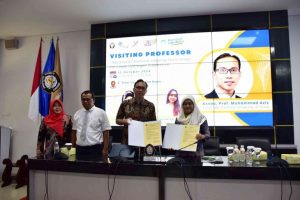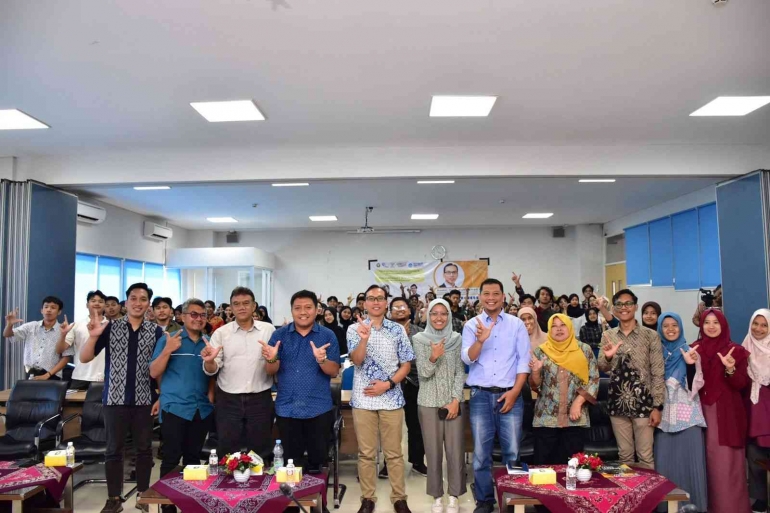Semarang – The Chemical Engineering Technology Program (TRKI) of the Vocational School at Universitas Diponegoro (UNDIP) held a Visiting Professor event from October 23 to 25, 2024. The event took place at Building A, 4th Floor, Conference Room, Vocational School, UNDIP, and was attended by students and faculty with great enthusiasm. The event was coordinated by Hermawan Dwi Ariyanto, ST, M.Sc, Ph.D., with Assoc. Prof. Muhammad Aziz from Tokyo University as the keynote speaker, and Vierina Putri Anindya serving as the master of ceremony.

The event was divided into three sessions, each focused on a different theme, offering new insights and practical guidance for participants in the fields of research and academic writing.
Session 1: “Advanced Chemical Looping Technology for Clean Hydrogen Production”
The first session, held on October 23, 2024, was titled Advanced Chemical Looping Technology for Clean Hydrogen Production. The session began at 08:45 AM and lasted until 12:00 PM. In her opening remarks, Dr.Eng. Vita Paramita, Vice Dean II of the Vocational School at UNDIP, emphasized the importance of technological innovation in supporting the development of clean energy. Prof. Muhammad Aziz then presented on chemical looping technology as a solution for clean hydrogen production, covering both the fundamental concepts and its applications in the energy industry. This session was attended by students and faculty from the Vocational School at UNDIP, particularly from the TRKI program, who actively engaged with the detailed explanations provided on the topic.
Session 2: “Coaching in Writing Scientific Articles”
On October 24, 2024, the second session, titled Coaching in Writing Scientific Articles, was held from 13:45 to 16:00. This session focused on providing training to participants on how to write effective scientific articles and prepare them for publication in reputable international journals. Prof. Aziz guided participants on selecting research topics, writing methodologies, and tips for improving manuscript quality before publication. The content of the session was particularly beneficial for students interested in writing scientific articles and publishing them in international journals.
Session 3: “From Dream to Reality: Navigating the Path to Japanese Scholarships”
The final session, held on October 25, 2024, was titled From Dream to Reality: Navigating the Path to Japanese Scholarships. This session, which ran from 08:00 AM to 11:10 AM, focused on motivating and providing practical guidance for students interested in pursuing their studies in Japan through scholarships. Prof. Aziz shared his experiences and offered tips on how to secure a scholarship in Japan, as well as the steps needed to ensure a smooth application process. This session received a warm reception from students interested in studying abroad, particularly in Japan.
Each session concluded with a Q&A segment, allowing participants to engage directly with the speaker and discuss the topics further. The questions covered a wide range of areas, from technical aspects of research to practical tips for achieving academic and professional goals. One participant, Nurika, shared her positive impressions of the event: “I was truly inspired by the materials presented, especially the topic of chemical looping technology for clean hydrogen production. This is a highly relevant topic in the growing field of clean energy. The session on writing scientific articles was also very helpful in preparing me for future scientific publications. Additionally, the session on Japanese scholarships motivated me to start taking steps towards studying abroad. This event really opened my eyes and provided clear direction for my academic career development,” said Nurika.
The event concluded with a thank-you note from the Vocational School of UNDIP to Prof. Muhammad Aziz for his willingness to share his knowledge and valuable experiences. The Visiting Professor activity is expected to inspire international research enthusiasm among students and faculty at UNDIP and encourage the creation of broader academic collaborations in the future.


Recent Comments